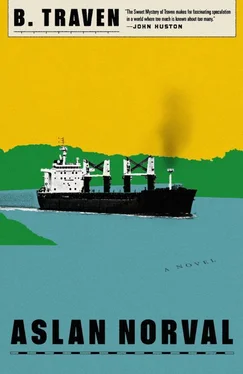Although Beckford had prepared her, Aslan was quite surprised about the piles of newspapers, clippings, telegrams, and letters that had accumulated in the APTC offices during her absence. As Amy explained, most of the telegrams and letters were ones that congratulated Aslan on her enterprising spirit, which had allowed her to defend her ideas and plans so superbly in front of the senators. A significant part of the correspondence consisted of questions regarding where and at what price you could buy APTC shares. There were telegrams with the same questions from Canada, South America, Belgium, France, Germany, the Netherlands, Sweden, Norway, and Denmark. Amy gave Aslan an overview of what the newspapers had reported in the last few days.
“The newspapers only mentioned the hearing in front of the committee in the first few days. These days, you don’t read anything about the hearing. Instead you hear about what senators, members of congress, and politicians in general have to say about your project. It appears that the powerful newspapers are on your side, ma’am.”
“And why shouldn’t they be?” answered Aslan. “It’s a billion-dollar business that the canal or the railway will provide for the large and heavy industries, who are the ones funding the newspapers. The powers that be in industry can smell the fact that large army deliveries won’t exist anymore if Russia and our country can come to an agreement, which could happen overnight as things have been developing recently. Our project will give large industry more work for longer and with greater security than the army could ever do. The army devours and devours resources, but it is completely unproductive. Our railway project on the other hand, is very productive and promises profits that will not be any smaller than those of the unproductive war industry at the end of the day.”
“I never considered such results and possibilities,” Amy said, surprised.
It was indeed exactly as Beckford had described it to Aslan when they had sat on the hotel terrace. A complete reversal in public opinion and general interest of the population had occurred. People were tired of the eternal fearmongering and turned their thoughts and expectations toward something positive, finally to channel their incredible creativity and irrepressible energy into new areas of activity. One such new area of activity was the execution of this gigantic plan, a plan so huge that humans had never dared imagine anything like it before.
Within the span of three weeks, it was not even a question anymore whether the canal or the railway would be built. No, the only question occupying the public was short and sweet: When do we begin building the railway?
Three weeks were enough for the majority of the most experienced engineers to decide in favor of the railway, as Aslan had broadly outlined it during the hearing in front of the committee. It would cost much less to build the railway than the canal. They would have to buy much less land. The construction of the railway would only take five, and at most, eight years if the cooperation were well organized. How many ships could be transported from one ocean to the other only depended on the number of freight trains.
Instead of a single sluice that would lift each ship hydraulically onto the freight train, you could build six, ten, or even more sluices side by side if necessary. They would lift the ships onto a sidetrack at first, from where the ships would later move to the main tracks.
The newspapers discussed the smallest details of the project’s various problems. Engineers who had something new and interesting to write received up to five thousand dollars per article. The readers devoured those articles more eagerly than the common stories about scandals, which were published daily, and where yesterday’s differed from today’s only in the names of the protagonists.
Editors constantly received letters from readers with new, sometimes very useful proposals. However, they had discussed every technical problem so often and from so many perspectives that it seemed there was nothing new to expect. Suddenly the question appeared: Where is the money coming from for the execution of this project? Who will pay? It had become clear that it was not a matter of hundreds of millions but rather about many hundreds of billions of dollars. Courageous reporters found answers and shared them with their readers in their newspapers at the risk of being summoned in front of an investigating committee accused of worshipping anti-American ideas.
They said take the money from where it does not serve any purpose but to keep all nations of this earth, all people of goodwill in constant fear of hydrogen bombs. It works like this: Keep the Russians and their colonial peoples afraid of the mercenary Americans. Instill in Americans terrible fear of the potentially destructive desires of the Bolsheviks, who have no religion and no culture. Anxiety. Fear. Horror. Threats. Keep people afraid and anxious, and you can take up to ninety-two percent of their income and they will even say thank you. Their fear of imprisonment for tax evasion will help you. Fear is the most pitiless and cruelest enabler of dictators.
Where is the money coming from? We have so much money that we throw it at countries that do not even want it, they were saying. Not even England said thank you. And why should they? Don’t they like the Bolsheviks more than us in England? However, we lack the courage to admit that.
Ten minutes after publication of the newspaper that had printed the question “Where is the money coming from?” the author of the article and the editor who had accepted it were unemployed on the streets.
However, two days later a notice appeared that was worthy of printing: The Bolsheviks, not the Russians, no, the Bolsheviks had managed to create a remote-controlled hydrogen warhead. At a range of eight thousand kilometers, it would miss its target at worst by a mere forty meters. It was capable of a destructive power ten billion times stronger and more destructive than that of the atomic bomb that had exploded over Hiroshima.
The ink of this news had barely dried in the papers when the American Department of Defense reported that they had successfully remote-controlled an unmanned airplane from an underground cave. If this plane left Cape Canaveral, Florida, at exactly 7:13 in the morning, it would fly around the globe in precisely nineteen minutes and would be capable of dropping its hydrogen bombs over the center of Lake Michigan 12.46 seconds later.
The American newspapers did not have to wait long for an answer from the Bolsheviks. This time, it was an invisible wall of radar that rotated high in the atmosphere and was remote-controlled from the ground. It was capable not only of catching any rocket fired by the Americans but also of propelling it back at a precisely calculated angle so that it would explode over the center of Times Square in New York. And people wasted their time with these inventions and counterinventions. They were kept prisoners in laboratories, squeezed into uniforms, and decorated with glittering medals. They squandered and idled away their short, valuable, measured time on earth, their life. A life that had been given to them only once until eternity and which they could never repeat to serve more noble purposes.
Certain circles tried to get the world to understand that it was impossible to live together with the enemies of culture and civilization, and that we should not even try to do so. Newspapers, speeches in Congress, and keynotes constantly kept the possibility of a nuclear-and-hydrogen war alive. Nevertheless, the project of the Inter-American-Atlantic-Pacific-Connection inspired both public and private opinions with increasing enthusiasm daily. Even militarists began sending articles to the newspapers. They supported the project decisively, of course, only from a military perspective.
Читать дальше










